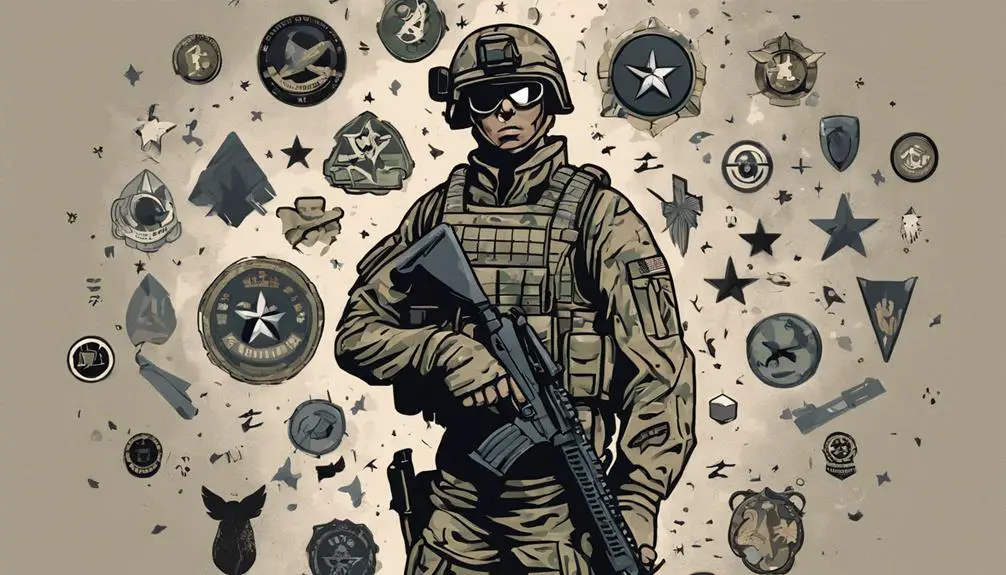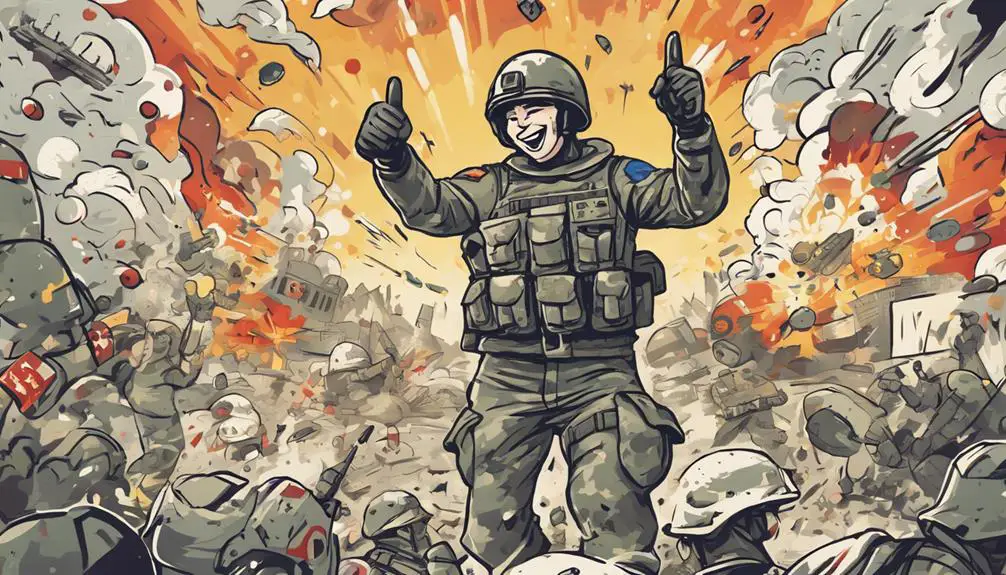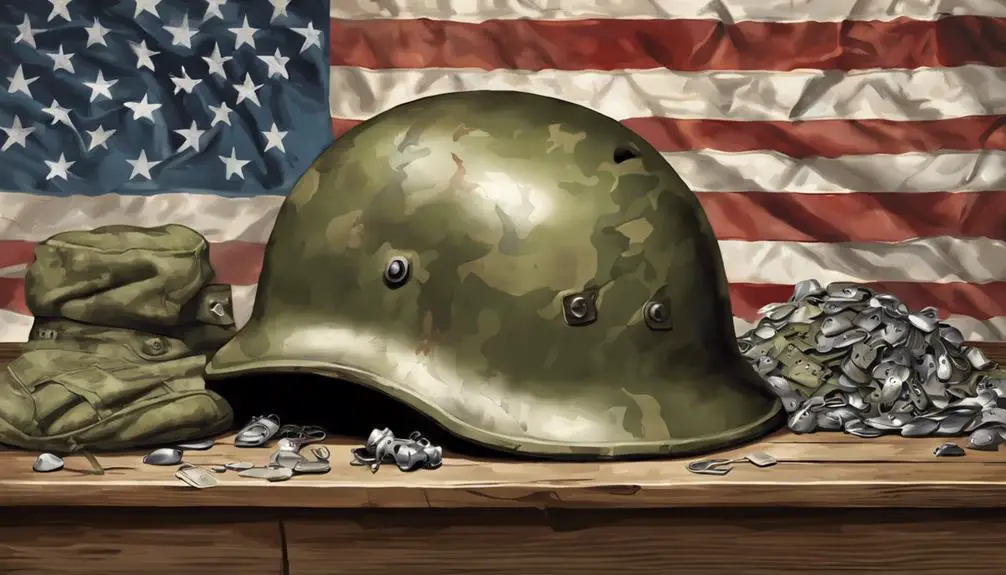You're about to enter a world of unique language that's been shaped by the need for secrecy, brevity, and camaraderie. Military slang emerged in the early 20th century as a response to the need for shorthand communication. You'll encounter phrases like 'Hooah!' and 'Ruck up!' in boot camp, and acronyms like 'COA' and 'SITREP' in tactical operations. Understanding ranks and roles through slang terms like 'Butterbar' and 'Top' is essential. But military lingo isn't all serious; dark humor and satire also play a role. As you explore this world, you'll uncover the nuances of army jargon and how it evolves.
Origins of Military Slang

As you explore the world of army military slang, you'll discover that its origins are rooted in the early 20th century. Military slang, a unique aspect of army culture, has its roots in the early 20th century, emerging as a response to the need for secrecy and shorthand communication on the battlefield.
During World War I, soldiers relied on coded language to convey crucial information without alerting the enemy. This early form of military slang was influenced by historical events and cultural borrowing. You'll notice that military slang often borrowed from various cultural and linguistic sources, such as African American Vernacular English, Latin American Spanish, and even Native American languages.
Historical influences, like the need for secrecy during wartime, also played a significant role in shaping military slang. For instance, soldiers used abbreviations and acronyms to quickly convey complex information, a practice that continues to this day.
As you explore the world of military slang, you'll uncover the fascinating history and cultural exchange that have shaped this unique aspect of army culture.
Essential Phrases for Newbies
Mastering essential phrases is important for new recruits to quickly integrate into army culture and communicate effectively with their comrades, so start by learning these fundamental phrases that will get you started on the right foot.
As a newbie, you'll want to familiarize yourself with Boot Camp Basics, such as 'Hooah!' (an expression of excitement or agreement) and 'Ruck up!' (get your gear ready).
You'll also encounter Rookie Rituals like 'Drop and give me 20!' (do 20 push-ups as a form of punishment or motivation) and 'Fall out!' (dismissed or released from duty).
When interacting with your drill sergeant or fellow soldiers, use phrases like 'Yes, drill sergeant!' or 'Roger that!' to show respect and understanding. To clarify instructions, ask 'Huh?' or 'Say again?'
Don't forget to address your superiors with 'Sergeant' or 'Sir/Ma'am.' By incorporating these essential phrases into your vocabulary, you'll quickly earn the respect of your comrades and demonstrate your commitment to army culture.
Tactical Terms and Acronyms

You'll need to understand tactical terms and acronyms to effectively communicate with your team during missions and operations. In the heat of the moment, clear communication can be the difference between success and failure. Familiarizing yourself with key terms and abbreviations will guarantee you can quickly convey vital information to your teammates.
Communication Codes, such as 'Roger that' (meaning 'I understand') and 'Say again' (requesting clarification), are essential for effective communication.
You'll also need to be familiar with Battlefield Abbreviations, like 'COA' (Course of Action) and 'SITREP' (Situation Report). These abbreviations help convey complex information quickly and efficiently.
Understanding tactical terms and acronyms will also help you stay focused on the mission at hand. By using standardized terminology, you'll reduce confusion and ensure smooth communication with your team.
Slang for Ranks and Roles
In the Army, understanding slang for ranks and roles is essential for quick identification and effective communication, especially in high-pressure situations where clarity is paramount. You'll need to know the lingo to effectively communicate with your team and superiors.
Ranks, in particular, have distinct slang terms that are widely recognized. For instance, you'll hear 'Butterbar' to refer to a Second Lieutenant, while a First Sergeant is often called 'Top.' Officer nicknames like 'Six' for a Captain or 'Five-Oh' for a Lieutenant Colonel are also common.
Additionally, recognizing Rank Insignia is crucial, as it helps you quickly identify an individual's rank and role. You'll see these insignia on uniforms, and understanding what they represent is essential for effective communication.
Humor in Military Lingo

Military slang often incorporates humor to lighten the mood, with phrases like 'Hurry up and wait' poking fun at the Army's notorious bureaucracy. You might find yourself chuckling at the irony of 'Embrace the suck,' a phrase that acknowledges the inevitable frustrations of military life.
But military humor can also be darker, often relying on satire to cope with the harsh realities of war.
Here are a few examples of how humor is used in military lingo:
- Dark humor: Phrases like 'Born to die' or 'Bullet magnet' use gallows humor to acknowledge the dangers of combat.
- Satirical sketches: Military personnel often create humorous skits or videos that poke fun at military culture, like the infamous 'Safety Brief' video that spoofs the Army's lengthy safety briefings.
- Ironic expressions: Phrases like 'We're not lost, we're just maneuvering' or 'I'm not arguing, I'm just explaining why I'm right' use irony to highlight the absurdities of military life.
Evolution of Army Jargon
Moreover, the exploration of Army slang reveals that the language has evolved over time, reflecting changes in technology, tactics, and cultural influences.
The evolution of Army jargon is a dynamic process, shaped by various influence factors. One significant factor is technological advancements, which have introduced new terminology and abbreviations. For instance, the rise of digital communication has led to the creation of acronyms like 'OPSEC' (operational security) and 'COMSEC' (communications security).
Another key factor is language adaptation, where military personnel borrow words and phrases from other languages, such as 'haji' from Arabic, meaning 'pilgrim' or 'friend.' Cultural exchange programs and deployments have also contributed to the adaptation of local slang, enriching the Army's linguistic repertoire.
Moreover, the integration of women and minorities has brought new perspectives and terminology, expanding the Army's linguistic diversity. As the Army continues to evolve, its language will continue to adapt, reflecting the changing needs and experiences of its personnel.
Frequently Asked Questions
Do Civilians Use Military Slang in Everyday Conversation?
One might ponder if civilians adopt military slang in casual conversations.
Intriguingly, this phenomenon is linked to cultural appropriation and social identity.
When civilians use military slang, they often do so to signal a sense of toughness or authority.
However, this adoption can be seen as cultural appropriation, where cultural symbols are taken without understanding their original context.
This raises questions about social identity and the boundaries between different groups.
Is Military Slang Only Used in the Army or All Branches?
As you explore the use of military slang, you'll find it's not unique to the army. Across all branches, you'll encounter distinct slang, reflecting each service's culture and history.
Branch differences are evident, with the Navy using 'deck' for floor and the Air Force saying 'chow' for food. Service exceptions exist, too, like the Marines' 'Hoo-ah' for agreement.
While similarities exist, each branch has its own flavor of slang.
Can Military Slang Be Used in Formal Writing or Reports?
Can you imagine submitting a report to your superior officer with phrases like 'Hooah' or 'O Dark Thirty'? Probably not. When it comes to formal writing or reports, you should stick to a formal tone and professional language.
Military slang has its place, but it's not in official documents. Using colloquialisms can undermine your credibility and blur the lines of professionalism.
Keep your writing concise, clear, and free of slang to guarantee your message is taken seriously.
Are There Regional Differences in Military Slang Usage?
You'll find that regional differences in slang usage are common. Slang dialects often develop based on geographic variations in culture, history, and demographics.
For instance, coastal regions might use nautical terms, while inland areas might use agricultural references. These regional flavors can lead to diverse slang usage, even within the same language or community.
Understanding these differences is essential for effective communication and avoiding misunderstandings.
Is Military Slang Used in Other Countries' Armed Forces?
As you explore the world of military lingo, you'll find that slang isn't unique to your home turf. In fact, militaries globally have their own brand of colloquialisms.
Cross-cultural comparisons reveal that international adaptations of military slang are widespread. From French 'poilus' to Australian 'diggers,' each nation's armed forces have developed their own distinct dialects.
You'll discover that military slang is a universal language, transcending borders and cultures.
Conclusion
As you depart this journey through army military slang, remember that language is like a battlefield – constantly shifting, adapting, and evolving.
Just as Sun Tzu's 'The Art of War' remains a timeless guide, understanding military lingo is essential for maneuvering the ranks.
Now, go forth, soldier, and 'Roger that' your way through the trenches of military communication.







